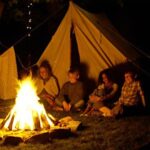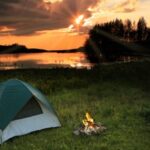by Liz Childers
Lost in the Woods enjoys finding practitioners of interesting and unique outdoor skills. For over 25 years, Cathy Farneman has been growing and collecting medicinal plants. She uses these to create tinctures, salves, powdered herbs, and herb infused oils. In this first part of our interview with Cathy, she shares how she came to use medicinal plants and why they are so important.
Why did you begin growing medicinal plants? Was there a specific event that made you want to begin growing the medicinal plants?
I began using medicinal plants for medicine because pharmaceuticals had failed to help me and made things worse. I have had a circulation disease and osteoarthritis all my life, so I live with pain. About 20 years ago I also developed Fibromyalgia. Our MD had me using aspirin for pain relief, anti-inflammatory and flexibility until I developed ulcers in my stomach. I was then switched to ibuprofen. As my body adapted to it, I needed more and more to get relief. I eventually developed kidney problems from the ibuprofen. People introduced me to using herbs to relieve my symptoms, and the herbs worked better without the problematic side effects. At first I just purchased the herbs and compounds I needed from places like heath food stores. But I also found that if I purchased herbs and herbal medicines directly from people who gathered, grew and made them, such as people I met at Mountain Man Rendezvous and Primitive Skills Camps ,which we attended, those seemed to work the best. One of these herbalists encouraged me to learn to gather and grow my own herbs and process them myself. A series of teachers came into my life at that time, who taught me to recognize the medicinal plants that grow within a 200 mile radius of my home, plus others I could find when I travel away from home. They taught me the plants, what parts to use, when and how to harvest them, and how to extract the medicinal properties and use them.
I began growing medicinal plants in my herb garden so that some of the plants not available in the wild in our area would be accessible to me.

Poison Hemlock (left) and Osha root (right) are easily confused. Oshu Root has great medicinal properties, but if it is confused for Poison Hemlock, the results are very dangerous.
How did you learn to make medicinal compounds from plants?
As I mentioned in question 1, the teachers that came into my life taught me how best to use the plants we gathered and the plants I grow. Some of the plants I harvest and dry for later use. With some of them, I extract the medicinal properties into alcohol, which not only makes a strong, concentrated medicine but also preserves the medicinal properties for many years; these are known as tinctures. The tincture combination are known as compounds; many of the compounds I make arose because I needed several tinctured herbs at once, and it was easier to combine them into one medicinal compound. From that experience I learned that often the herbs complement each other, making a medicinal compound that is stronger and more effective than each one would be separately. My teachers taught me to let my inner spirit guide me on how to do this process. I rely a lot on that inspiration, not only for making medicinal compounds, but also to know what will help me, a family member, or someone who comes to me for help.
What, if any, are the risks associated with making or taking these products?
The risks are great and can be deadly. One should not try to harvest wild plants to use for medicine unless you can make an absolutely correct identification that you have the intended plant, know what part of the plant to gather and when to harvest it, and what to do with it after harvest. This is best learned from a hands-on instructor with vast experience. Going only by a book can lead to misidentification. You would only make that mistake once in the case of a plant such as Poison Hemlock, which is in the same family as Osha root and looks similar in the above ground foliage.
Also, the medicinal properties of plants are real medicine, and can have drug interactions (some favorable and some dangerous) just as pharmaceuticals can have. Additionally, mixing herbal medicines with pharmaceuticals can be dangerous. One should never use plants as medicine, mix herbal medicines with prescribed medicines, or switch from a prescribed medicine to an herbal medicine without first consulting your health care professional. Medicinal herbs should only be used under the guidance of someone who knows the risks and how to use them.
Do you practice any other primitive skills?
Yes. My husband and I teach at Primitive Skills Camps around the western USA. We know how to live using “primitive skills” and teach others to do so. We make fire by friction, can live in the wilderness without modern equipment, using what is out there to make shelter, gather food, cook food, safely use water sources, etc. We can make bread using “gathered wild yeast.” We preserve some of our harvested foods from our garden and the wild with fermentation processes. We use a lot of what people now call “pioneering skills,” which were just the way people lived before modern times. It is empowering to know how to do these things, just as it is empowering to know how to use plants for medicinal needs. It is all a part of practicing our self-reliance skills. We are presently building a homestead on three acres of land in central Utah. We have active solar power, a water well, and our own septic system, so we are “off grid” as far as utilities go. We are in the planning stages of an orchard and garden, including above and belowground greenhouses.
Why do you feel medicinal plants are important?
They are important to me because the medicinal properties of plants work with and within my body systems to repair problems, relieve symptoms and strengthen immune response without the terrible side effects I get from the man made chemical compounds of pharmaceutical medicines. The medicinal properties as found in nature are more complete and not isolated ingredients. They tend to work with my body’s healing processes instead of against them. The body is a miraculous healing mechanism. I have found that if you relieve the stress that injury and illness can impose, the body then can heal itself. Stress inhibits the immune response, so causing more stress by introducing chemicals, which can have a poisonous effect on my body, will not be conducive to healing for me. Also, if there comes a time when we cannot get medicines made by pharmaceutical companies (such as in times of disasters, wars, trucking strikes, etc.), knowing what plants can provide our medicines will be an important part of staying or getting well.
Check Lost in the Woods tomorrow for part 2 of our interview with Cathy. Until then, if you want to learn more about Cathy and her practice or to purchase any of her medicinal herbal compounds, visit her website.
Please note: The FDA does not approve the above statements about the healing properties of plants and how I use them. They are from personal experiences and those of others and, in some cases, historical information. They should not be construed as advice to you for medicinal purposes.



